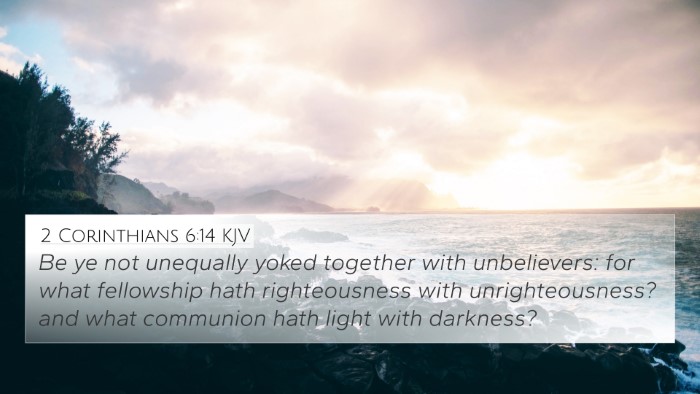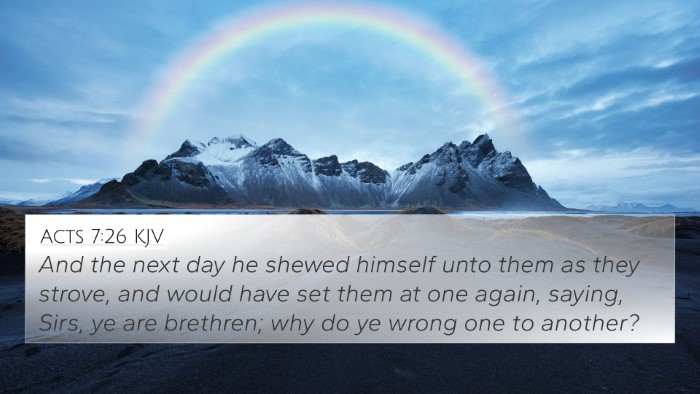Understanding 1 Corinthians 6:6
Verse: "But brother goes to law against brother, and that before unbelievers!"
General Meaning
In this verse, the Apostle Paul highlights the shameful behavior of believers resolving disputes in secular courts rather than within the body of Christ. This not only undermines the integrity of the church but also misrepresents the Christian community to non-believers.
Commentary Insights
- Matthew Henry: He emphasizes the serious nature of internal conflicts among Christians, asserting that it is a poor testimony to the onlooking world. Henry suggests that disputes should be settled among believers to uphold the honor of the Gospel.
- Albert Barnes: Barnes notes that secular courts are not the appropriate venue for resolving disputes among believers. He highlights the principle that Christians should strive for reconciliation within the community, rather than letting personal grievances lead to public controversies.
- Adam Clarke: Clarke elucidates the idea that taking a fellow believer to court demonstrates a lack of love and unity within the church. He further argues that such actions can lead to a breakdown of fellowship and witness.
Cross-References
This verse can be linked to several other Biblical texts that reinforce its themes:
- Matthew 18:15-17: Instructions on resolving personal disputes directly with the individual involved, advocating for reconciliation and community resolution.
- 1 Corinthians 6:1-3: Paul discusses the principle that believers are to judge disputes among themselves, as they are destined to judge the world.
- Ephesians 4:31-32: Encouragement to be kind and forgiving to one another, reflecting the love of Christ in all relationships.
- James 4:11-12: James warns against speaking evil of one another and indicates that only God has the authority to judge.
- Galatians 6:1: A call to restore those who have sinned gently, which emphasizes community support and resolution.
- Romans 12:18: Paul urges peace with all men, indicating a believer's responsibility to pursue peace actively.
- Philippians 4:2: Paul encourages unity among believers, highlighting the importance of maintaining harmony in the church.
Theological Considerations
The behavior of taking a brother to court reflects broader theological implications:
- Unity in the Body of Christ: Disputes undermine the essential unity that believers are called to maintain.
- Witness to the World: The way Christians handle disputes serves as a testimony to non-believers about the transformative power of Christ in their lives.
- Authority of the Church: Believers are given the authority to resolve conflicts through biblical principles, emphasizing the sufficiency of Scripture for guidance in all matters of life.
Practical Application
In light of this verse, believers are challenged to:
- Seek to resolve conflicts internally with wisdom and grace.
- Prioritize unity and love over personal grievances.
- Foster a culture of reconciliation within their communities.
Conclusion
1 Corinthians 6:6 serves as a reminder to Christians of the importance of maintaining a cordial and forgiving spirit, avoiding the public jurisdiction of worldly institutions for resolutions that are meant to be handled within the church. Such behavior not only honors God but also strengthens the testimony of the church in the eyes of the world.
SEO Keywords
In this discussion, we have touched on various connections between Bible verses related to 1 Corinthians 6:6. These Bible verse cross-references offer a deeper comparative Bible verse analysis, showcasing how other scriptures interrelate in themes of conflict resolution, unity, and the witness of believers.
For believers seeking to understand how to use Bible cross-references, tools such as Bible concordance, and comprehensive Bible cross-reference materials can enhance their study by revealing thematic Bible verse connections and Links between the Prophets and Apostolic teachings.













